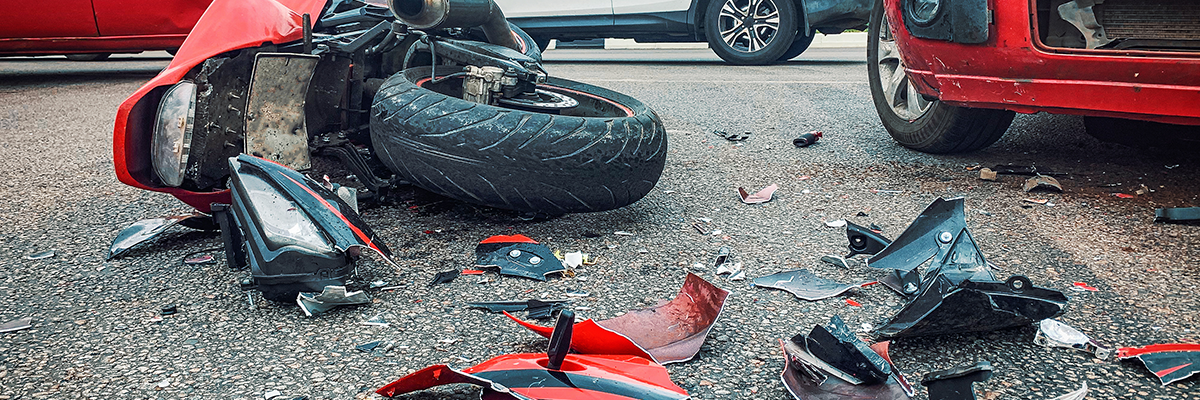How is Motorbike Injury Compensation Calculated in the UK?
Motorcyclists are among the most vulnerable road users, and when an accident happens, the consequences can be life changing. From fractures and road rash to serious spinal or head injuries, the physical, emotional, and financial impact can be significant. Understandably, one of the first questions people ask after a collision is: “How much compensation am I likely to receive?”

While no two cases are identical, motorbike injury compensation in England and Wales follows a structured, evidence-based approach. In this article our personal injury lawyer, Bradley Wright, explains how compensation is assessed, what factors influence a pay-out, and how a specialist solicitor can help ensure that nothing is missed.
General Damages vs Special Damages
If you’ve been injured in a motorbike accident and are thinking about making a compensation claim, your damages will usually fall into two categories: general damages, which reflect your pain and suffering, and special damages, which cover your financial losses.
What are General Damages in a Motorcycle Injury Compensation Claim?
General damages are awarded for pain, suffering, and loss of amenity. In other words, they reflect the injury itself, how severe it is, how long recovery takes, whether it causes long-term symptoms, and how it affects day-to-day life.
For example, a mild fracture with a full recovery is valued very differently to a spinal injury causing permanent mobility problems.
What are Special Damages in a Motorcycle Injury Compensation Claim?
Special damages compensate you for your financial losses that are connected to the accident. These typically include:
- Loss of earnings (including future loss of earnings, if relevant)
- Medical and rehabilitation costs
- Travel expenses for treatment
- Damage to clothing, protective gear, or the motorcycle
- Care provided by professionals or family members
- Any adaptations required at home or work
Special damages can form a substantial part of a claim, particularly for those with long-term injuries or those unable to return to their previous occupation.

A Guide to Making a Motorcycle Accident Personal Injury Claim
If you’ve been injured in a motorcycle accident that wasn’t your fault, you may be entitled to compensation. This guide explains the key steps involved in making a motorbike accident injury claim, from seeking medical attention and gathering evidence to understanding compensation and time limits. Learn how specialist solicitors can support your claim from start to finish.
The Role of the Judicial College Guidelines
General damages are guided by a publication known as the Judicial College Guidelines (JCG). These guidelines set out typical compensation brackets for different injury types and severities based on past court decisions.
Examples include:
- Minor soft tissue injuries with recovery within months
- Severe fractures requiring surgery
- Amputations
- Serious head or brain injuries
- Spinal injuries leading to permanent disability
The JCG are not legally binding but provides a starting point. At Edwards Duthie Shamash, our expert personal injury solicitor will assess your medical evidence and compare it to the most suitable bracket within the JCG.
Medical Evidence: The Backbone of a Motorbike Injury Compensation Claim
A key part of valuing a claim is obtaining an independent medical report from a qualified expert. This report will describe:
- The exact nature of your injuries
- Your treatment and recovery
- Any long-term symptoms
- The impact on physical function, work, and daily activities
- Prognosis
In more serious cases, multiple reports from different specialists may be required. A neurologist, for example, may be needed to assess head injuries, while an orthopaedic surgeon might assess fractures and mobility issues.
Without strong medical evidence, it is very difficult to accurately value a claim.
Factors That Influence Compensation
Even where two claimants have similar injuries, their compensation for a motorbike injury may differ considerably. Key influencing factors include:
1. Severity and permanence of the injury – Long-term or life-altering injuries command significantly higher awards.
2. Impact on employment – If an injury results in time off work, retraining, reduced hours, or an inability to continue in the same profession, compensation will reflect this, often forming the largest part of a claim.
3. Treatment and rehabilitation needs – Ongoing physiotherapy, surgery, psychological therapy, or specialist equipment may all be recoverable.
4. Loss of enjoyment of life – Hobbies and activities that can no longer be enjoyed due to injury, for example, riding, sports, or caring for family, are factored into general damages.
5. Vulnerability of motorcyclists – Because motorcyclists have little physical protection, injuries are often more serious. Courts and insurers recognise this heightened risk and its impact on recovery and quality of life.
Documenting Your Losses
Motorcyclists are often surprised at the range of losses that can be claimed. To maximise compensation, it is essential to gather:
- receipts and invoices
- wage slips
- medical reports
- quotes for repairs
- proof of care provided (professional or family)
- evidence of travel expenses
Our motorbike injury lawyer, Bradley Wright, will help you gather and organise this evidence, ensuring that all losses (including anticipated future costs) are properly quantified.
What are the Time Limits and Legal Costs for a Motorcycle Injury Compensation Claim?
Most personal injury claims must be brought within three years of the accident, though there are exceptions. Acting early allows your solicitor to gather evidence while it is still fresh and secure key documents, such as CCTV or witness statements.
Edwards Duthie Shamash’s motorbike injury solicitors work on a No Win No Fee basis, meaning legal costs are only payable if the claim is successful. This makes access to justice affordable, even for those unable to work and therefore on a lower income after an accident.

If you have been injured as a result of a motorbike accident then you may be eligible for compensation. Our experienced personal injury solicitors are here to support you through this difficult process, helping you secure the compensation and rehabilitation you are entitled to.
Why Use a Specialist Motorbike Injury Solicitor?
Motorbike accidents differ from other road traffic collisions. Speed, visibility issues, and road conditions often play more significant roles. A specialist solicitor understands:
- the unique injury patterns common in motorcycle crashes
- how to challenge insurer allegations of “rider error”
- the evidence needed to prove liability and maximise compensation
With many years’ experience and success, our motorbike injury solicitors will ensure that no aspect of your claim is overlooked and that your compensation reflects the true impact of the accident.
Motorcycle Injury Lawyers: Conclusion
Calculating motorbike injury compensation is a detailed and evidence-based process. It considers not only the physical injury but also the broader impact on work, lifestyle, finances, and long-term wellbeing. By working with our specialist personal injury solicitor, you can be confident that your claim will be accurately valued and supported by strong evidence, enabling you to focus on recovery while we handle the legal process.
Motorcycle Injury Compensation Claim FAQs
The length of a claim depends on the complexity of the case, the severity of the injuries and whether liability is disputed. Straightforward claims with clear liability may settle within a few months, while serious injury cases requiring multiple medical reports can take 12–24 months or longer. Your solicitor will update you throughout and may be able to arrange interim payments where appropriate.
Our motorbike injury claims are handled on a No Win No Fee basis, meaning you do not pay anything upfront. Edwards Duthie Shamash Solicitors is paid through a success fee only if your claim succeeds. This ensures access to expert legal representation without financial risk at a time when you may already be dealing with lost income or expensive treatment costs.
Useful evidence includes medical records, independent medical reports, photographs of your injuries, repair estimates for your motorcycle, wage slips showing lost earnings, and receipts for treatment or travel expenses. Dashcam or helmet-cam footage, CCTV, and witness statements can also significantly strengthen your claim. Your solicitor will advise on what is needed and gather evidence on your behalf.
Yes. Even if you share some responsibility, for example, if you were slightly exceeding the speed limit, you may still be entitled to compensation. This is known as contributory negligence. Your compensation may be reduced by a percentage that reflects your level of fault, but the claim itself remains valid. Our expert personal injury lawyers can help argue against any unfair reductions.
Absolutely. Special damages include both past and future financial losses, which may cover long-term rehabilitation, ongoing medical treatment, home adaptations, mobility aids, and future earnings if your ability to work has been affected. In serious injury cases, future losses can form the largest part of the claim. Your solicitor will obtain expert evidence to calculate these accurately.
